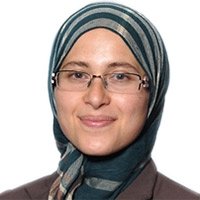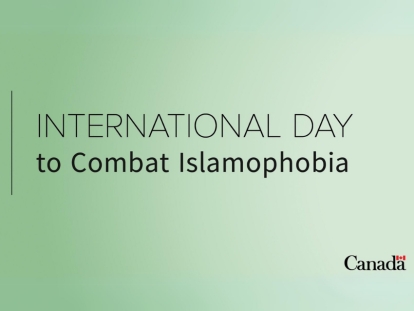Jan
Jan
A visionary group of Canadian Somali youth has been providing their peers with inspiration and guidance as part of the Somali Canadian Youth Mentorship Program. It's a program that aims to connect young people with successful professionals and university students in Ottawa. Ifrah Hassan spoke with the Muslim Link's Amira Elghawaby about the initiative.
ML: How did this SCYM start?
SCYM started out as just an idea in the summer of 2009 when a group of us got together and started having weekly meetings. Initially we wanted to create a recreational space or after school drop-in centre where Somali high school students could come in to do both fun and educational activities. As well, it was supposed to be a place where they felt safe to share any problems they may have been going through personally, with an older and caring person. Our overall objective was to keep our youth off the streets.
ML: Why did you want to get involved with this?
We wanted to get involved because like many others, we were too tired and hurt from hearing about the problems (drop-outs and run-ins with police etc) that more and more of our Somali youth are facing. So we thought to ourselves “What are we doing to help?” And more importantly, “What can we do to help?” After doing some research, we realized there wasn't any community program that is strictly dedicated to serving Somali youth combat the current pressing challenges. At this point it became very apparent to us that we needed to get involved and we needed to do so immediately.
ML: What gave you the idea that there was a need for this kind of initiative?
Before going forward with our initial ideal of creating the recreational space, we decided to run a quick questionnaire with five questions and interviewed 60 Somali parents across the Ottawa area. The questions were mainly asking about types of problems they think our youth are facing and what type of solutions should be put in place. After gathering and analyzing all the responses we have come to the conclusion that the best approach to help keep our youth on the right course was through Mentorship Program.
ML: How does the program work?
The way the program works is very simple. We match one mentor (either a professional or a 3rd/4th year college/university student) with 3-5 students, depending on the number of students that sign up. Mentors meet with mentees once a week for one hour for the duration of a semester. The program is designed to address three major topics or stages in the mentorship process: building self-esteem; exploring educational and career interests; and establishing personalized educational/career goals.
ML: How are Somali kids doing generally?
From our experience and in talking with community leaders and educators, Somali high school female students are doing relatively well in comparison to male students. And again, according to the community leaders and educators, (the poor performance of the boys) has to do with the lack of resources and access to after school programs and the professional community.
ML: What are some of their challenges?
Their main challenges are not having access to a lot of resources that are strictly there to address their challenges.
ML: What efforts are underway to address these?
There are currently six different home work clubs across the city open Monday to Thursday and run by the Somali Teachers' Association.
ML: How do you think mentors can help?
Mentors can help by leading as examples and inspiring the youth that they too can become something. The biggest advantage of SCYM is that the program is for, and by, Somalis. Therefore, the mentees connect and relate to the mentors a lot more than they probably would have with mentors of different background.
ML: Who has signed up to be mentors?
So far we had a mixture of both post-secondary students and professionals as our mentors.
ML: Who is signing up to be mentees?
Our mentees so far have been students from all grades 9 to12 and the number of girls and boys are about the same.
ML: How many altogether are participating in the program?
This is our second year running the program and as of Dec. 22, 2012, the number of students that have completed and graduated will be 28.
ML: Have you received any funding or support? From whom?
So far we have received some help from the Somali Teachers' Association and individual community members.
ML: What else do you hope for to have this succeed?
We hope to grow the program and offer it to more students in different neighborhoods. Right now the program is only running in the South End and we hope to launch it at the West End as early as Feb 2013 insha Allah (God willing). Our biggest challenge right now is getting free facilities and finding enough volunteer mentors for each semester.
ML: Any other final thoughts or comments?
My advice to anyone who is thinking of starting a similar initiative is to please just go ahead and start somewhere. Don't worry about funding, support or getting approval from others as all that will come once you get started insha Allah.
To learn more about the programme, visit: www.scym.ca
This article was produced exclusively for Muslim Link and should not be copied without prior permission from the site. For permission, please write to info@muslimlink.ca.

Amira Elghawaby
Amira Elghawaby is Muslim Link’s Editorial Advisor. She is providing professional guidance and training to the Muslim Link team and writers. Amira is also developing relevant newspaper and website policies and a style guide. Amira obtained a degree in Journalism and Law from Carleton University in 2001. Since then, she has worked as both a full-time and freelance journalist and editor, writing and producing stories for a variety of media including the Globe and Mail, the Toronto Star, CBC-Radio, Rabble and the Middle East Times. She is the History Editor for New Canadian Media. Find her on Twitter @AmiraElghawaby.
Latest from Amira Elghawaby
-
 Canada's Special Representative on Combatting Islamophobia Sends Letter to College and University Presidents As School Year Begins
Canada's Special Representative on Combatting Islamophobia Sends Letter to College and University Presidents As School Year Begins
-
 Statement from the Special Representative on Combatting Islamophobia on the Third Anniversary of the London Family Attack
Statement from the Special Representative on Combatting Islamophobia on the Third Anniversary of the London Family Attack
-
 Statement by Minister Khera and Special Representative Elghawaby on the International Day to Combat Islamophobia
Statement by Minister Khera and Special Representative Elghawaby on the International Day to Combat Islamophobia












